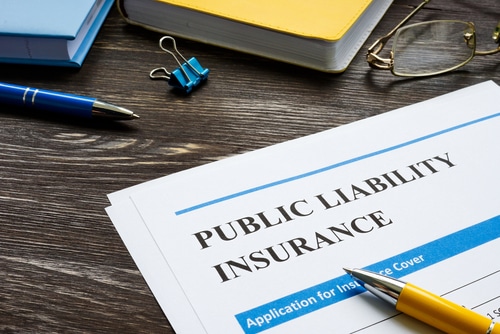Employers Liability Insurance
Compare employers liability Insurance quotes
- Complete one short form
- Quickly compare quotes
- Find a great deal today

Lowering the cost of your employers’ liability cover
As an employer, you are responsible for protecting your employees, including a legal obligation from having employers’ liability insurance cover in place. But what is it, and how does it work? How much does this type of insurance cost, and what does it cover?
Below, you’ll find the answers to all of these questions and more, including our helpful FAQ section. To find out more about taking out Employers’ Liability cover, read along for more information.
What Is Employers’ Liability Insurance?
Employers’ liability insurance covers employers and their businesses for compensation costs in the event of an employee or ex-employee claiming a job-related illness or injury.
It’s a legal requirement to have employers’ liability insurance if you’ve employed workers, including various types of subcontractors. If it’s discovered that you don’t have insurance, you could face a fine of up to £2,500 for each employee per day.
Who Will Need Employers’ Liability Insurance?
If you have employees who are not family members, you have a legal obligation to have employers’ liability insurance in place, even if you only have one employee. This is according to the Employers’ Liability Act 1969.
It will cover you against compensation claims from employees for an illness or injury caused by them working for you. You’ll need to have employers’ liability coverage in place if:
- You deduct National Insurance and income tax from your employees’ wages
- You dictate how, where, and when they work
- You provide their work equipment and materials
- You’re entitled to any profit your employees make
- You need them to perform the services you hire them for, and they’re not allowed to employ a stand-in if they can’t perform the work
- They do the same duties as your other employees
How Much Employers’ Liability Insurance Do I Need?
As a legal minimum requirement, your insurance policy must provide coverage for at least £5 million. However, many insurers typically offer coverage worth £10 million as an industry standard.
The higher risk, the more costly your policy will be, but you must be suitably covered.

What Is Covered By Employers’ Liability Insurance?
What can employers’ liability insurance protect against? It covers a wide range of costs that your company could face if confronted with problems with an employee.
It protects you against the expense of potential compensation claims, including payments and legal costs to the employee who is injured or ill. This could be the result of an unsafe working environment or equipment.
Casual workers
Employers’ liability insurance covers even casual workers, which can include students who are on work experience and volunteers, even if they’re not being paid. However, check that volunteers are covered on your insurance before taking them on.
Loss of income
Being injured or ill means your employee will lose precious income. Employers’ liability coverage means your employees’ losses will be covered while recovering.
Legal costs
Legal fees can become very expensive and have adverse financial effects on a business, particularly small enterprises. Employers’ liability insurance can cover the legal costs of resolving claims that have been made by your employees.
Medical bills
Your employee may need medical treatment for any injuries or illnesses due to working for you. Having employers’ liability cover means you and your business will be protected from these medical expenses.
Compensation
Your employer’s liability coverage will cover court-awarded compensation needed to pay your employee.
Third-party injury
A third-party claim is if one of your employees accidentally causes injury to a customer while they’re working for you. For example, if an employee accidentally splashes a customer’s hand with hot water in your Cafe, the third-party makes a claim.
Another scenario could be if a runner trips and falls over a sign or board outside your retail establishment that an employee forgot to move. Employers’ liability insurance means you’ll be protected from third-party injury claims.
Third-party property damage
You might have to make a third-party claim if one of your employees accidentally causes damage to someone else’s property while working for you.
A few examples include if your employee is making a presentation to a client and they accidentally knock the client’s laptop onto the floor, causing damage to it.
If your employee accidentally drops paint on a new carpet during a client’s renovation, the carpet needs to be replaced.
Is Employers’ Liability Insurance A Legal Requirement In The UK?
Yes, for most UK businesses, having employers’ liability coverage is a legally compulsory insurance policy. However, there are some exceptions, including companies that employ family members or employees based abroad. But if this is the case, make sure you confirm the country’s law where those employees live.
Additionally, if you only hire contractors, they may not legally be classified as your employees, so you might not need to have insurance.
Are there any exceptions?
Yes, in certain circumstances, this type of coverage is not legally required. Below you’ll find some exceptions where insurance isn’t needed.
Certain limited companies
If you’re a director of a limited company with no employees and over 50% shares, you’ll be exempt from having liability insurance. However, if you employ just one person, you’ll need to have this insurance in place.
But you might find that your clients need you to have this type of coverage before you can commence work, so it may be worth investing in it.
Sole traders
If you’re a business owner and don’t have any employees, apprentices, or volunteers working for you, liability insurance isn’t a legal requirement. There aren’t any employees that may have accidents or become ill, so this type of insurance would be completely unnecessary.
Family members
If you only employ direct family members, you aren’t legally required to have coverage in place, but you may want to consider purchasing insurance anyway.
If you don’t have insurance and an accident happens, you’ll be liable for compensation claims and potential legal fees.
Public bodies
Many public health services, organisations and government departments have different insurance requirements, so employers’ liability coverage is unnecessary.
How To Lower The Chances Of A Claim
The simplest and easiest way to minimise the risk of having to make a claim is to ensure that your working environment has good health and safety practices.
Providing your employees with proper training and safe and well-maintained equipment can also reduce any injuries in your workplace. Perform an updated risk assessment if a new job position, equipment, or procedure is brought to your workplace.

What Are The Costs Of Employers’ Liability Insurance?
So how much does employers’ liability insurance cost? The answer is completely different for everyone. This is because many factors affect the cost of insurance. Below you’ll find some key factors influencing how much your insurance policy will cost.
What influences the cost of employers’ liability insurance?
Type of Business
If your business is in a high-risk industry, you’re likely to pay more for your insurance. Builders, plumbers and other similar services where employees use heavy machinery and equipment are more likely to become injured so the insurance coverage may be more expensive.
Number of Employees
Another factor that can strongly influence how expensive your insurance is is how many employees you have. In simple terms, the more staff members you hire, the more expensive it will be to ensure all of them.
Your Turnover
The cost of your insurance will also be calculated based on your revenue. A company with a high turnover will be more expensive to insure than a smaller company with lower revenue.
The amount you need to cover will also influence the cost. Although you’re legally required to have the cover of at least £5 million, insurance policies typically have limits of £10 million. Of course, if you need a higher level of cover, the price will increase.

Why Compare Employers’ Liability Insurance With Utility Saving Expert?
Here at Utility Saving Expert, we believe in helping people find the best insurance deal at the best price. As a completely independent site, we’re proud to offer our customers unbiased and clear comparison results that will search for the best deals among the UK’s top insurance companies.
We know how tedious and inconvenient it can be to look for insurance, whether you’re searching for a new policy or looking to switch your current provider. That’s why we’ve made our online comparison tool quick and easy to use.
Comparing insurance quotes with Utility Saving Expert is very easy – provide us with a few details about your company. Our helpful comparison tool will find the best deals for you. You’ll be given a list of quotes from top UK providers tailored to suit your business needs.
Once you’ve found the perfect policy for your business, you can apply for it directly through our website. Or, if you have any questions or worries about purchasing a policy, you can talk to one of our friendly experts by calling us on 01242 32 31 31.
This depends on which insurance provider you choose. When you start the comparison process with us, be sure to state how many staff members you need to cover. We can then match you and your business to the most suitable insurers.
With that in mind, there are different rules for insuring subcontractors and contractors:
- Subcontractors: This can be complicated because if the person is subcontracted for labour-only, they’ll be using work equipment that’s provided by you. This means they will have to be covered as an employee. But, genuine subcontractors may not need to be insured. If you’re not sure, confirm this with them before you hire.
- Contractors: According to the Government Health and Safety Executive, if an independent contractor also works for another company, they may not need to be insured. Individual cases may need to be reviewed, so if you’re not sure, make sure you refer back to your policy, seek legal advice, or talk to your insurer.
As an employer, you have a legal responsibility for the safety of your workers, including those who work from home. Insurance typically provides some cover for workers who operate from home, but this depends on a few factors such as:
- Your policy
- The activities involved
- The specifics of a claim
Some policies won’t cover every worker, and they may only cover specific activities, such as admin duties. You must also be aware that failing to do certain things, such as a risk assessment of your worker’s environment, may render your insurance policy invalid.
What your insurance covers can be a bit of a grey area as it can be hard to work out which illnesses or injuries happened because of your employee’s work. As the employer, you may also not be responsible for the physical aspects of your worker’s environment, such as ventilation, infrastructure safety and design, and fire evacuation.
In that case, you’ll need to refer back to your policy to confirm this. In normal circumstances, all workers will be covered, but it may not be the case for people working from home.
As for direct family members and overseas workers, you’re not legally obligated to have insurance in place. But, you should still take steps to make sure health and safety standards are good, to avoid nasty accidents and potential claims.
The main difference between employers’ liability and public liability insurance is who claims against you or your business.
If the claim has been made from one of your workers, you’ll be covered by your employers’ liability policy.
If the claim is being submitted by somebody outside your business, public liability insurance will cover you. Public liability cover protects your business from claims made by members of the public or clients regarding property damage or accidents caused by your business.
Public liability insurance will cover any legal and compensation costs you may have to pay out to a third-party. For example, if a customer in your shop trips over a sign or loose floorboard, they injure themselves.




